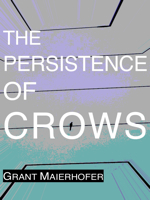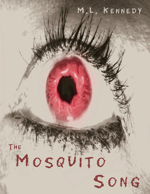The wind howled like grieving wolves. Annie pulled her hat down over her ears to quiet the screams, tucking her long, white hair underneath. The Santa Anas tangled everything, charging the dry air and crackling her clothes. She could sometimes see the blue, static sparks rising from her fingertips and feel the shock of contact with everything she touched.
Finding shelter from the wind would be tough today, Annie thought. The day center near the riverbed had closed the day before, leaving the neighborhood homeless one less place to go, pushing them further into the streets where they were not wanted. Annie tried to remember the name of another shelter and the name of the street but the screaming voice was back in her brain. She shook her head to try and quiet the sound, closed her eyes to make it go away.
The loud honk of a car horn snapped her back, startling the voice back into its cave. It would stay quiet long enough for Annie to safely cross the street, at least allowing her body to move out of harm’s way. But her mind was another story. The shrill voice she heard would not go away and she often felt an urgency to understand what was being said, as if there was a message in the words from God. But they were not words, really. Animal screams or sirens or shrieking winds.
Annie made her way to a small, abandoned house and sat against the large, brick wall that surrounded it. The smell of food from nearby restaurants made her stomach growl. She thought of the smells of her mother’s kitchen and the way the smell of fresh baked bread would send her running downstairs. But that was long ago, before the voices.
The 70 years of Annie’s life were punctuated by fear. Days ran together like splattered paint that mixes up the color until one is indistinguishable from another. She could not remember specific events. Even her childhood memories were fragmented, the scenes did not connect. She wrapped herself tightly in a blanket from her bedroll and began to fall asleep in a spot of sun. But the voice yelled, “ANNIE!!”
She did not respond. Sometimes the scream would stop if she did not react, staying very still and going further into her invisible place. But when she heard her name again, she realized it was not the inner voice and had a sense of someone standing over her. Annie opened her eyes.
Oh God, not the church lady, Annie thought. But there she stood, one arm reaching out for Annie’s hand, the other carrying a to-go container with what smelled like Mexican food inside. Annie blinked her eyes and sat up against the wall again, accepting the food with gratitude but bracing for the inevitable sermon that would come next. The screaming voice within her shouted, “OH CHRIST ON A CRACKER!” and this made Annie laugh.
As the church lady read scripture, Annie thought about the snakes. The members of her mother’s Pentecostal church back in Kentucky practiced handling rattlesnakes and cottonmouths to prove their faith. Annie remembered the baskets of wriggling snakes, arms reaching into the dark opening, people speaking in tongues. By 5 years old, Annie was familiar with the sight of her mother’s large body sprawled out on the church floor, babbling incoherently, eyes rolling back in her head. The church lady asked if she could pray with her. (God, no, Annie thought.). But she closed her eyes and bowed her head.
As a child, when she began to hear the voices, Annie’s mother took her to see the pastor at Church of God. It was surely a failure of faith or something evil trying to enter her soul that only Jesus could heal. More praying, more speaking in tongues. Annie merely learned to pretend the voices were gone and not speak of them. She could not suffer the babbling congregation or the disappointed eyes, staring at her as if she were Christ’s first failure.
When Annie was 10 years old, her family moved from Kentucky to Fontana, California, where her father took a job in a steel mill. From their house on Bloomington Avenue, they could see the smoke stacks from the yard. Leaving the woods of the Appalachian’s for this somewhat barren landscape was not an easy adjustment for Annie. When the screaming voice would get too loud to ignore back in Kentucky, she had been able to lose herself down by the river and let the sounds of the water flood over her, sometimes drowning out the scream. But Fontana offered nothing but gravel and concrete, with a row of eucalyptus trees along the nearby freeway. Annie took to her room.
Annie’s bedroom walls began closing in around her and the voices became louder, eventually drowning out the other sounds. She would not hear her mother’s voice, the teacher’s voice, the voice of the pastor. Annie would sit in one spot for hours, without a blink, trying to decipher this new communication, this new and somewhat scolding voice. A voice that sounded warnings in a new language.
Patton State Hospital sat at the foot of the San Bernardino mountains, only a half hour drive from Annie’s house and close enough for frequent family visits. Her mother would rattle on as if they were really having a conversation, maybe sitting in the kitchen at home. How did she not hear the jingling keys and the electronic doors or notice the antiseptic smell? Even with the drugs they fed her, Annie was keenly aware that this was not their kitchen at home and not a place one relaxes. The sense of an unpredictable danger lurked everywhere on the hospital grounds, disguised behind smiles and soft voices. This was Annie’s new home.
But the state hospital would prove to be Annie’s last home. In the 1980’s, along with many other patients, she was put out on the street. Since she was now an adult and not considered to be a danger to herself or others, it was decided she could fend for herself. She was given her prescriptions along with directions to a resource center where she was expected to check in regularly. Thirty-five years ago, Annie had taken her few possessions and disappeared down Highland Avenue, into the citrus-scented air.
“Annie”, someone called. She felt a gentle tug on her shoulder, someone reaching into the storm pipe she was sleeping in. Annie knew the man’s voice and was not frightened. Bill had proven himself to be a dedicated friend. He was a Social Worker with Mental Health who regularly checked on Annie as well as many other homeless clients. He kept track of all their medications and the locations of their camps. Annie wiggled out of her sleeping bag and smiled up at him. She liked the kindness in his eyes. Plus, he did not pray over her and wanted nothing more than to see that she was safe.
Bill asked the usual questions. Was she eating? Had she been mistreated by anyone? Was she sure she did not want to stay at the women’s shelter and get out of the weather? Annie passed her almost empty medicine bottle to Bill and he counted what was left. “Good job,” Bill said. “You’re right on schedule.”
Annie had learned years ago that the medicine would help to quiet the scream, and even though it didn’t silence it, she was happy to take the pills. Bill made sure she did not run out.
Annie’s camp was near the riverbed that crossed the highway leading to Running Springs. There had been citrus groves once. Annie remembered the intoxicating smells of the blossoms and the smell of smudge pots during winter. There were only houses now, dotting the highway on both sides, and the homeless camps at the edge of the riverbed with shelters made of colored tarps and found objects.
Annie needed to be outdoors and feared the wet weather that forced her inside. She agreed to let Bill take her to the women’s shelter only on those cold, stormy nights.
The walls that framed the bunk room were very thin and the sounds were overwhelming. She could hear ghosts rattling within ghosts and the screams in all the sleeping heads. The voice inside her brain would become louder, competing for Annie’s attention like a spoiled child. She never slept there.
Annie built a small fire to warm her hands and looked out at the spring morning. The snow on the top of San Gorgonio was beginning to melt and Annie could smell new grass growing out of the rich, dark soil around her. Suddenly Donny was standing in front of her, his arm outstretched toward her, offering her a Winchell’s coffee. Donny was a deaf man who could not speak, about half Annie’s age, who also camped near the riverbed.
They often sat together like this or walked together to the church that gave the fruit away. Without words, they understood each other. Annie wondered about his very quiet world, and thought she would like to trade the loud noise in her head for just a moment of that silence.
Bill had reminded Annie that a church was giving out donations of clothes and new backpacks today. She and Donny would walk together. But when Annie stood, her legs felt especially weak. Her legs had always been dependable and this was a new sensation. But Annie pushed through with determination as she and Donny headed down Alabama Street.
The screaming voice in Annie’s head began to sound like radio static at full volume. She shook her head, but it wouldn’t stop. Donny watched her struggle to walk, then motion to him that she needed to sit. He helped her get to a soft mound of grass just next to the sidewalk and held her arm as she sat down. Donny wasn’t sure if the voices Annie heard had sabotaged her or if this was something else. He sat on the ground in front of her and watched her face.
When Donny saw the color in Annie’s face go blue, he sprinted across Alabama Street and into the riverbed, flailing his arms and screaming with his deaf voice, hoping to catch the attention of someone who could help. He saw that Bill was still visiting the camps, squatted down before a homeless man in the distance. Donny screamed again.
Annie heard him scream from where she sat. She fell back into the grass and heard the grass growing taller all around her, blades loosening the earth as they pushed their way through. Annie saw the bright, morning sky turn dark, cobalt blue, then saw herself next to the river back in Kentucky, pushing through branches to get down to the water’s edge. The screaming voice had gone from static to the sound of pouring rain or a powerful waterfall. Annie wanted to bathe in it, to disappear into the sound.
She knew that Bill and Donny were there and heard voices talking over her. Bill held Annie’s hand and told her help was coming, but Annie shook her head. Let me be.
Then the scream became the sound of music in the distance. It sounded like a tune by Hank Williams that her father used to like. She remembered sitting on her father’s lap in the pickup truck as he pretended to let her drive. She could smell the mill on his clothes and cigarettes on his breath. Annie imagined her head against his chest, the way he held her when he read to her before bed. She felt him pull her in tight. She felt herself melt back into the warmth of his body, 70 years of life scatter to the wind. And then the screaming stopped. And so did Annie’s heart.
 AUTHOR BIO:: Raised by wolves in the Mojave desert, Lisa was released to civilization at an early age, where she discovered books of poetry by Anne Sexton, novels by Tom Robbins and characters like Bonanza Jellybean. Her poetry has been previously published in Jeopardy, a Western Washington University publication, Howl, and the Desert Writers Issue of The Sun Runner.
AUTHOR BIO:: Raised by wolves in the Mojave desert, Lisa was released to civilization at an early age, where she discovered books of poetry by Anne Sexton, novels by Tom Robbins and characters like Bonanza Jellybean. Her poetry has been previously published in Jeopardy, a Western Washington University publication, Howl, and the Desert Writers Issue of The Sun Runner.








